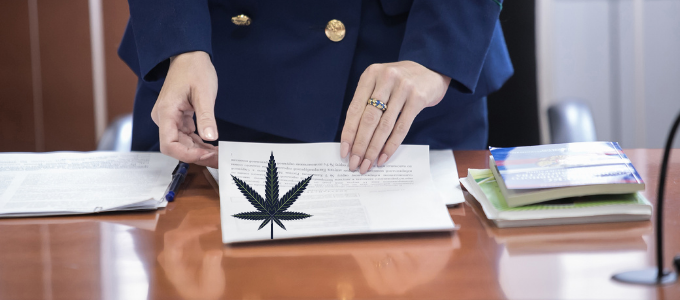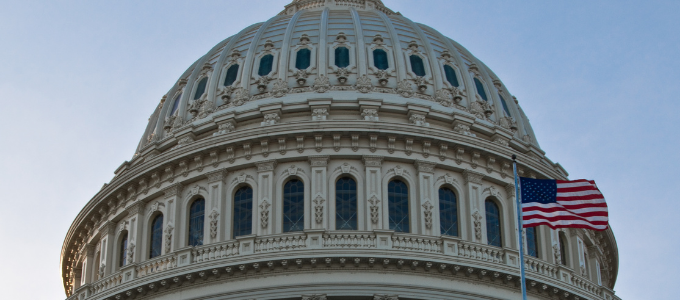
States across the US are changing their views on cannabis, and they have been doing so for some time. That’s why it was monumental to see movement at the federal level, and not just the state. On December 4, 2020, the US House of Representatives passed H.B. 3884, titled the “Marijuana Opportunity Reinvestment and Expungement Act of 2020”, or the MORE Act for short. But when will weed be federally legal?

While it is likely to be blocked in the Senate, the passage at the House of Representatives comes after 50+ years of strict federal prohibition of marijuana. While it may have taken a lifetime, and we still are not there yet, this is hopeful - and not just because it would make marijuana federally legal.
The bill is loaded with resolutions that reach across political parties and offers some compassion for the mistakes and tragedies our criminal justice system has placed on consumers, growers, and non-malicious purveyors.
Let’s take a look.
The Wall Street Journal reports “The vote was largely along party lines. Libertarian Rep. Justin Amash of Michigan and five Republicans voted in favor of the bill, including Rep. Matt Gaetz (R., Fla.) who was a cosponsor. Six Democrats voted against the bill, all centrist lawmakers.”
The bill passed the House with 228 Congressperson's voting in favor and 164 votings against the Bill, marking the first time since 1970 a measure for reforming cannabis laws that make marijuana federally legal was passed by either chamber of Congress.
There are several high-impact components in the Bill, most of which can stunningly reduce the past, existing, and future harm individuals and communities have faced from criminalization.
Given these harms are and have always disproportionately impacted minority communities, the push to right the wrongs of our systems is front and center in the minds of many voters - and it seems most US House representatives support change as well. See some of their remarks below.
If signed into law, the MORE act would remove cannabis from the Controlled Substances Act, effectively leaving it to states to determine how they want their residents to engage with the plant.
“Across this nation, thousands of men and women have suffered needlessly from the federal criminalization of marijuana, particularly in communities of color and have borne the burden of collateral consequences for those ensnared in criminal legal systems that have damaged our society across generations.” - Rep. Sheila Jackson Lee (D-TX)
The legislation would impose a five percent federal tax on cannabis products. These funds would be used by programs in communities hurt by the war on drugs.
According to Marijuana Moment, “As now structured, the MORE Act would make it so cannabis would be federally taxed at five percent for the first two years after implementation and then increased by one percent each year until reaching eight percent. After five years, taxes would be applied to marijuana products based on weight rather than price.”
If passed, the MORE Act would both make cannabis federally legal - or at least states can choose without fear of a federal crackdown - and would create a Community Reinvestment Grant Program.
The program would use tax dollars for job training, literacy programs, and youth recreation and mentoring services, and numerous other community services and organizations.
“This is about allowing states and localities to self-determine what their marijuana policies should be.” - Justin Strekal, political director at the National Organization for the Reform of Marijuana Laws, to WSJ.

Within the bill, there are measures to resentence individuals currently incarcerated for criminal offenses related to cannabis. While ‘resentence’ means that the individual may still be sentenced for a crime, under the MORE Act, a majority of low-level cannabis offenses will be expunged.
The Marijuana Opportunity Reinvestment and Expungement Act of 2020 clarifies that not all marijuana offenses are eligible for expungement. More specifically, violent marijuana offenders and “kingpins” will be barred from resentencing/ expungement under the MORE Act.
Under the rules making cannabis federally legal, the number of incarcerated individuals for nonviolent marijuana charges would see a substantial drop.
The rules go on to say that the Transportation Department and Coast Guard may continue to include marijuana in drug testing programs, but most federal employees (and applicants) would no longer be ineligible for work because they got high on holiday. Hurray!
If you didn’t know, marijuana testing was a federal employee requirement. And since THC can be detected in urine for 2-4 weeks, people seeking federal employment had to worry about their employment, and their activities outside of the office would collide in a negative way. The MORE Act would allow this anxiety to disappear.
The bill, passed Dec. 4, 2020, aims to further protections for immigrant individuals and families. With regard to immigration laws, the MORE Act, in making marijuana federally legal, states the following:
“....an alien may not be denied any benefit or protection under the immigration laws based on any event, including conduct, a finding, an admission, addiction or abuse, an arrest, a juvenile adjudication, or a conviction, relating to cannabis, regardless of whether the event occurred before, on, or after the effective date of this Act.”
Under the MORE Act, a Cannabis Justice Office would be started. The Office would have appointees under the Justice Department. This individual or office would be responsible for distributing funds provided by the Small Business Administration (SBA) that provide loans for small cannabis businesses owned and controlled by socially and/ or economically disadvantaged individuals. These loans seek to reduce inequality by minimizing any existing bias or discrimination in current borrowing practices.

While the MORE Act passed the House of Representatives, the Senate is less favorable. The reasons for this are largely political and civil. However, since criminal penalties are being discussed, it is likely to cause a bit of frothy conversation first.
The passage of the MORE act in Congress marks a first, but also a half-way point. There is more political and social support for changing the law than ever before, but it is not yet enough. When will weed be federally legal?
Not yet, but we're almost there.





![(each) Northern Lights [.5g] (each) Northern Lights [.5g]](/rails/active_storage/representations/proxy/eyJfcmFpbHMiOnsiZGF0YSI6MTQ3MzAzNiwicHVyIjoiYmxvYl9pZCJ9fQ==--35b3869ddd2dda77e64c3f7fac63d3fca32d846a/eyJfcmFpbHMiOnsiZGF0YSI6eyJmb3JtYXQiOiJqcGVnIiwicmVzaXplIjoiNDYyIHggMzE1IiwiY29udmVydCI6IndlYnAifSwicHVyIjoidmFyaWF0aW9uIn19--ec16dfdba4bfa2885716a685324bbb155d297de3/441526883_c0acb699-ec45-4f0d-ac21-13ca35e18758.jpeg)








